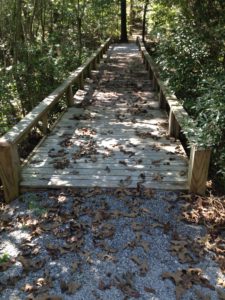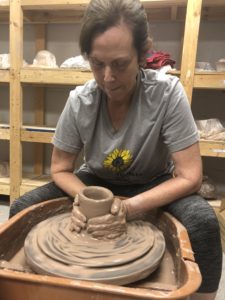 My mom fell last week. Julie, my sister, her caregiver, found her resting on the floor working her word searches. According to mom she took a tumble and, finding herself unable to get up, grabbed pillows and puzzles and made herself comfortable. She didn’t appear to have any injuries, so Julie was able to laugh instead of cry. It’s the latest incident highlighting both the effects of advanced Alzheimer’s and her uncanny ability to make the most of a bad situation. She’s a survivor. And that continuing survival now plagues me with near-daily questions regarding God’s will for a once-faithful Christian left to live in so much uncertainty.
My mom fell last week. Julie, my sister, her caregiver, found her resting on the floor working her word searches. According to mom she took a tumble and, finding herself unable to get up, grabbed pillows and puzzles and made herself comfortable. She didn’t appear to have any injuries, so Julie was able to laugh instead of cry. It’s the latest incident highlighting both the effects of advanced Alzheimer’s and her uncanny ability to make the most of a bad situation. She’s a survivor. And that continuing survival now plagues me with near-daily questions regarding God’s will for a once-faithful Christian left to live in so much uncertainty.
I’m not alone or even the first to think such thoughts. I guess basic human nature leads us to wonder what God is doing in the life of another. We compare and analyze the nature of blessing and suffering out of various motives. Peter did when confronted with a prophecy of his future martyrdom in John 21. He didn’t question Jesus regarding timing and manner of his own death, but he did ask what awaited his fellow disciple John. Jesus’ answer hits me where it once hit Peter – between eyes that long to see what was never intended for them. “If I want him to remain until I come, what is that to you? You Follow Me!” (John 21:22, NASB)
Oswald Chambers labels our stubborn refusal to stop interfering with God’s plan for someone else being an “amateur  providence”. I think little “p” providence is similar to little “g” god. We’re so intent on judging for ourselves the degree and means of completion of His work with another jar of clay that we reach out a hand to send it flying from the wheel while yelling “Enough!” I can’t tell you how many times I’ve prayed for God to release my mom from this present life I deem – and feel she would agree – as undignified and unproductive. Wasted. Wasteful.
providence”. I think little “p” providence is similar to little “g” god. We’re so intent on judging for ourselves the degree and means of completion of His work with another jar of clay that we reach out a hand to send it flying from the wheel while yelling “Enough!” I can’t tell you how many times I’ve prayed for God to release my mom from this present life I deem – and feel she would agree – as undignified and unproductive. Wasted. Wasteful.
But what Jesus says to Peter and allows to echo into my heart is that the wasted life is the one which allows questions to replace obedience. The “Follow Me” comes with no promise of greater revelation or insider information. F. B. Meyer says of this encounter that Jesus will not be our personal fortune teller. We are not commanded to see before we move; to understand before we follow. We’re simply told to walk. And following can involve walking through shadows of death, grief, Alzheimer’s, pain, uncertainty. Our one comfort is in knowing the One we follow sees and leads us through.
Many years before her own time with dementia, Elizabeth Elliott wrote, “Many deaths must go into reaching our maturity in Christ, many letting goes.” I learned in my dealing with Maggie’s cancer that trees suppress any reluctance to release the leaves they lose. The tree severs its connections – over and over – many letting goes – in order to survive and become new. I understood what that meant for me and Maggie, but I didn’t apply the lesson to Alzheimer’s and my mom. In full disclosure, I allowed my visits with her to dwindle during Maggie’s illness and after her loss for complex reasons best unpacked another day. Let’s just say for now I was overwhelmed with falling leaves. Let’s also say I was not obedient.
 “He who makes the hue of each fading leaf different from that of any other in the forest, has some new trait of godliness, some fresh feature of grace to illustrate and enforce in the dying hour,” Meyer reminds us. I demonstrate my own sinful hubris when I pronounce my mother’s life unproductive in its present form. Possibly by the world’s standards. Certainly not by the Creator’s. I’ve no idea what measure of faith still burns in her, what fresh feature of grace waits to be unlocked. I can’t guess what state of communion her soul has with God while her brain is erased neuron by neuron. But I know embers remain for He promises to never leave us (Deut. 31:6). Even if all spiritual activity lies dormant, there are distant fires, ones she fueled in others, still casting glory to God as a result of her. After Mom’s fall last week, Julie shared the story on Facebook. One friend commented with a photo of a yellowed card kept in her childhood bible written by Mom when teaching their high school Sunday School class. The note encouraged her to “always put Jesus first in your life.” I, too, followed my mom’s leading to the feet of Jesus.
“He who makes the hue of each fading leaf different from that of any other in the forest, has some new trait of godliness, some fresh feature of grace to illustrate and enforce in the dying hour,” Meyer reminds us. I demonstrate my own sinful hubris when I pronounce my mother’s life unproductive in its present form. Possibly by the world’s standards. Certainly not by the Creator’s. I’ve no idea what measure of faith still burns in her, what fresh feature of grace waits to be unlocked. I can’t guess what state of communion her soul has with God while her brain is erased neuron by neuron. But I know embers remain for He promises to never leave us (Deut. 31:6). Even if all spiritual activity lies dormant, there are distant fires, ones she fueled in others, still casting glory to God as a result of her. After Mom’s fall last week, Julie shared the story on Facebook. One friend commented with a photo of a yellowed card kept in her childhood bible written by Mom when teaching their high school Sunday School class. The note encouraged her to “always put Jesus first in your life.” I, too, followed my mom’s leading to the feet of Jesus.
I don’t know what part dementia plays in my mom’s spiritual maturity. It must contribute something I don’t have eyes to see. But I am sure as long as she has breath, He is not finished using it to refine her and me. To allow me a glimpse of Him I would otherwise miss looking up through a full canopy of leaves. Since saying goodbye to Maggie, I’ve settled into life at my own pace again. More of my time remains unclaimed by the tyranny of the urgent and efforts aimed at the survival of the living. But Spurgeon joins in my correction when he writes, “You do not belong to yourselves, not a hair of your head. There is not one minute of your time that you have a right to call your own.” Yes, just when I’ve adjusted to blooming where I’m planted, He calls me to follow Him to another place, back to a familiar task. Raking leaves.

Beautiful, Melissa.
Such glorious ways to deal with aging or illness! God bless you all. I am sure Maggie smiles from Heaven and totally!
Beautifully written!
This is so good! I used to work with the sick and elderly. Some asked me why God still had them here. They felt they had no purpose. I would respond that God is using them to make others more like Him. I learned more humility, gratefulness, and empathy in working with those who were “in their last days” for longer than they wanted to be. Made me look at my life differently and not take things for granted.
My mother had sudden (overnight) onset of Alzheimer’s. I thought she had had a stroke. About three and a half months before Alzheimer’s struck, she had a prognosis of death within six months due to her extremely weak heart. She couldn’t put enough words together to make a sentence and became reluctant to speak. She was under a compulsion to walk, a classic symptom of Alzheimer’s. She had to be in a nursing home, where her walking drove the nurses crazy. I visited and walked with her every morning until breakfast and every afternoon after work until dinner. She became very quiet and pleasant. I knew then and now that God was giving us that precious time together. She lived five years and when she didn’t come out from her afternoon nap, she was found unconscious in her bed. Her brain had flatlined, but she was still breathing in the ER. After about an hour, her breathing stopped and a few seconds later her pulse in her temple stopped. My wife and I were graced to be with her when she left this world. Praise the Lord!
Thank you for sharing your story with us. What a blessing to know God gave you that sweet time together.